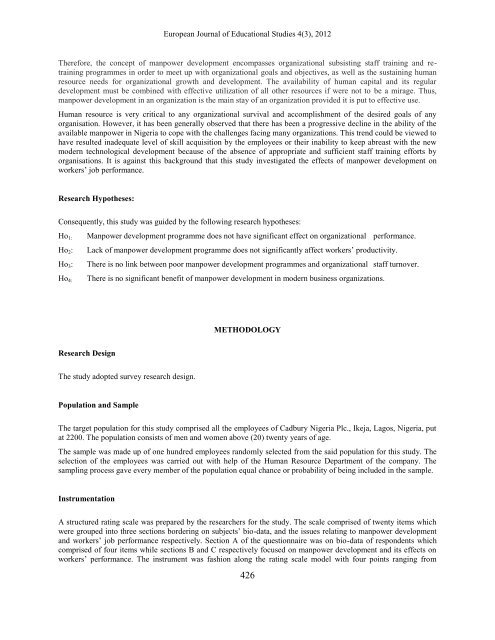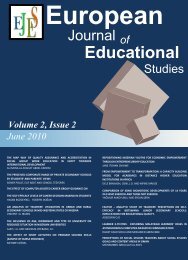Volume 4 Issue 3 (October 2012) - Ozean Publications
Volume 4 Issue 3 (October 2012) - Ozean Publications
Volume 4 Issue 3 (October 2012) - Ozean Publications
You also want an ePaper? Increase the reach of your titles
YUMPU automatically turns print PDFs into web optimized ePapers that Google loves.
European Journal of Educational Studies 4(3), <strong>2012</strong><br />
Therefore, the concept of manpower development encompasses organizational subsisting staff training and retraining<br />
programmes in order to meet up with organizational goals and objectives, as well as the sustaining human<br />
resource needs for organizational growth and development. The availability of human capital and its regular<br />
development must be combined with effective utilization of all other resources if were not to be a mirage. Thus,<br />
manpower development in an organization is the main stay of an organization provided it is put to effective use.<br />
Human resource is very critical to any organizational survival and accomplishment of the desired goals of any<br />
organisation. However, it has been generally observed that there has been a progressive decline in the ability of the<br />
available manpower in Nigeria to cope with the challenges facing many organizations. This trend could be viewed to<br />
have resulted inadequate level of skill acquisition by the employees or their inability to keep abreast with the new<br />
modern technological development because of the absence of appropriate and sufficient staff training efforts by<br />
organisations. It is against this background that this study investigated the effects of manpower development on<br />
workers’ job performance.<br />
Research Hypotheses:<br />
Consequently, this study was guided by the following research hypotheses:<br />
Ho 1:<br />
Ho 2 :<br />
Ho 3 :<br />
Ho 4:<br />
Manpower development programme does not have significant effect on organizational performance.<br />
Lack of manpower development programme does not significantly affect workers’ productivity.<br />
There is no link between poor manpower development programmes and organizational staff turnover.<br />
There is no significant benefit of manpower development in modern business organizations.<br />
METHODOLOGY<br />
Research Design<br />
The study adopted survey research design.<br />
Population and Sample<br />
The target population for this study comprised all the employees of Cadbury Nigeria Plc., Ikeja, Lagos, Nigeria, put<br />
at 2200. The population consists of men and women above (20) twenty years of age.<br />
The sample was made up of one hundred employees randomly selected from the said population for this study. The<br />
selection of the employees was carried out with help of the Human Resource Department of the company. The<br />
sampling process gave every member of the population equal chance or probability of being included in the sample.<br />
Instrumentation<br />
A structured rating scale was prepared by the researchers for the study. The scale comprised of twenty items which<br />
were grouped into three sections bordering on subjects’ bio-data, and the issues relating to manpower development<br />
and workers’ job performance respectively. Section A of the questionnaire was on bio-data of respondents which<br />
comprised of four items while sections B and C respectively focused on manpower development and its effects on<br />
workers’ performance. The instrument was fashion along the rating scale model with four points ranging from<br />
426

















